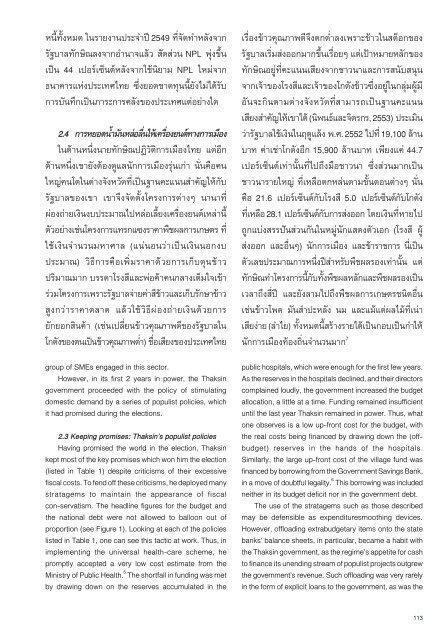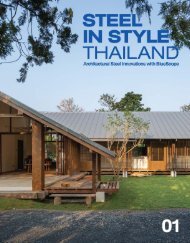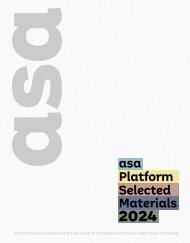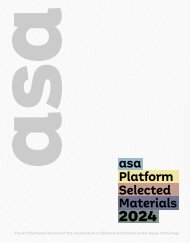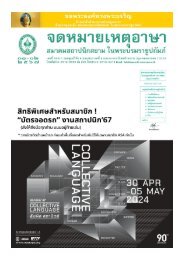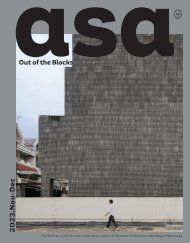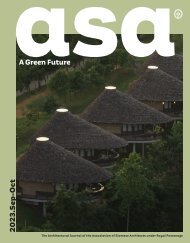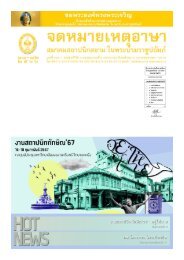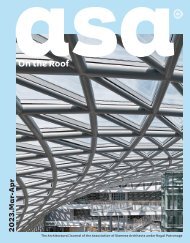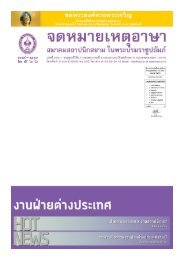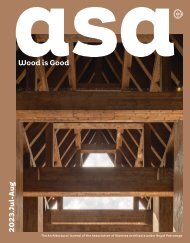บ้านเรือนถิ่นไทยในช่วงเจ็ดทศวรรษ 2489-2559
You also want an ePaper? Increase the reach of your titles
YUMPU automatically turns print PDFs into web optimized ePapers that Google loves.
่<br />
หนี้ทั้งหมด ในรายงานประจำปี 2549 ที่จัดทำหลังจาก<br />
รัฐบาลทักษิณลงจากอำนาจแล้ว สัดส่วน NPL พุ่งขึ้น<br />
เป็น 44 เปอร์เซ็นต์หลังจากใช้นิยาม NPL ใหม่จาก<br />
ธนาคารแห่งประเทศไทย ซึ่งยอดขาดทุนนี้ยังไม่ได้รับ<br />
การบันทึกเป็นภาระการคลังของประเทศแต่อย่างใด<br />
2.4 การหยอดน้ำมันหล่อลื่นให้เครื่องยนต์ทางการเมือง<br />
ในด้านหนึ่งนายทักษิณปฏิวัติการเมืองไทย แต่อีก<br />
ด้านหนึ่งเขายังต้องดูแลนักการเมืองรุ่นเก่า นั่นคือคน<br />
ใหญ่คนโตในต่างจังหวัดที่เป็นฐานคะแนนสำคัญให้กับ<br />
รัฐบาลของเขา เขาจึงจัดตั้งโครงการต่างๆ นานาที<br />
ผ่องถ่ายเงินงบประมาณไปหล่อเลี้ยงเครื่องยนต์เหล่านี้<br />
ตัวอย่างเช่นโครงการแทรกแซงราคาพืชผลการเกษตร ที่<br />
ใช้เงินจำนวนมหาศาล (แน่นอนว่าเป็นเงินนอกงบ<br />
ประมาณ) วิธีการคือเพิ่มราคาด้วยการเก็บตุนข้าว<br />
ปริมาณมาก บรรดาโรงสีและพ่อค้าคนกลางเต็มใจเข้า<br />
ร่วมโครงการเพราะรัฐบาลจ่ายค่าสีข้าวและเก็บรักษาข้าว<br />
สูงกว่าราคาตลาด แล้วใช้วิธีผ่องถ่ายเงินด้วยการ<br />
ยักยอกสินค้า (เช่นเปลี่ยนข้าวคุณภาพดีของรัฐบาลใน<br />
โกดังของตนเป็นข้าวคุณภาพต่ ำ) ชื่อเสียงของประเทศไทย<br />
group of SMEs engaged in this sector.<br />
However, in its first 2 years in power, the Thaksin<br />
government proceeded with the policy of stimulating<br />
domestic demand by a series of populist policies, which<br />
it had promised during the elections.<br />
2.3 Keeping promises: Thaksin’s populist policies<br />
Having promised the world in the election, Thaksin<br />
kept most of the key promises which won him the election<br />
(listed in Table 1) despite criticisms of their excessive<br />
fiscal costs. To fend off these criticisms, he deployed many<br />
stratagems to maintain the appearance of fiscal<br />
con-servatism. The headline figures for the budget and<br />
the national debt were not allowed to balloon out of<br />
proportion (see Figure 1). Looking at each of the policies<br />
listed in Table 1, one can see this tactic at work. Thus, in<br />
implementing the universal health-care scheme, he<br />
promptly accepted a very low cost estimate from the<br />
Ministry of Public Health. 5 The shortfall in funding was met<br />
by drawing down on the reserves accumulated in the<br />
เรื่องข้าวคุณภาพดีจึงตกต ่ำลงเพราะข้าวในสต็อกของ<br />
รัฐบาลเริ่มส่งออกมากขึ้นเรื่อยๆ แต่เป้าหมายหลักของ<br />
ทักษิณอยู่ที่คะแนนเสียงจากชาวนาและการสนับสนุน<br />
จากเจ้าของโรงสีและเจ้าของโกดังข้าวซึ่งอยู่ในกลุ่มผู้มี<br />
อันจะกินตามต่างจังหวัดที่สามารถเป็นฐานคะแนน<br />
เสียงสำคัญให้เขาได้ (นิพนธ์และจิตรกร, 2553) ประเมิน<br />
ว่ารัฐบาลใช้เงินในฤดูแล้ง พ.ศ. 2552 ไปที่ 19,100 ล้าน<br />
บาท ค่าเช่าโกดังอีก 15,900 ล้านบาท เพียงแค่ 44.7<br />
เปอร์เซ็นต์เท่านั้นที่ไปถึงมือชาวนา ซึ่งส่วนมากเป็น<br />
ชาวนารายใหญ่ ที่เหลือตกหล่นตามขั้นตอนต่างๆ นั่น<br />
คือ 21.6 เปอร์เซ็นต์กับโรงสี 5.0 เปอร์เซ็นต์กับโกดัง<br />
ที่เหลือ 28.1 เปอร์เซ็นต์กับการส่งออก โดยเงินที่หายไป<br />
ถูกแบ่งสรรปันส่วนกันในหมู่นักแสดงตัวเอก (โรงสี ผู้<br />
ส่งออก และอื่นๆ) นักการเมือง และข้าราชการ นี่เป็น<br />
ตัวเลขประมาณการหนึ่งปีสำหรับพืชผลรองเท่านั้น แต่<br />
ทักษิณทำโครงการนี้กับทั้งพืชผลหลักและพืชผลรองเป็น<br />
เวลาถึงสี่ปี และยังลามไปถึงพืชผลการเกษตรชนิดอื่น<br />
เช่นข้าวโพด มันสำปะหลัง นม และแม้แต่ผลไม้ที่เน่า<br />
เสียง่าย (ลำไย) ทั้งหมดนี้สร้างรายได้เป็นกอบเป็นกำให้<br />
นักการเมืองท้องถิ่นจำนวนมาก 7<br />
public hospitals, which were enough for the first few years.<br />
As the reserves in the hospitals declined, and their directors<br />
complained loudly, the government increased the budget<br />
allocation, a little at a time. Funding remained insufficient<br />
until the last year Thaksin remained in power. Thus, what<br />
one observes is a low up-front cost for the budget, with<br />
the real costs being financed by drawing down the (offbudget)<br />
reserves in the hands of the hospitals.<br />
Similarly, the large up-front cost of the village fund was<br />
financed by borrowing from the Government Savings Bank,<br />
in a move of doubtful legality. 6 This borrowing was included<br />
neither in its budget deficit nor in the government debt.<br />
The use of the stratagems such as those described<br />
may be defensible as expendituresmoothing devices.<br />
However, offloading extrabudgetary items onto the state<br />
banks’ balance sheets, in particular, became a habit with<br />
the Thaksin government, as the regime’s appetite for cash<br />
to finance its unending stream of populist projects outgrew<br />
the government’s revenue. Such offloading was very rarely<br />
in the form of explicit loans to the government, as was the<br />
113


